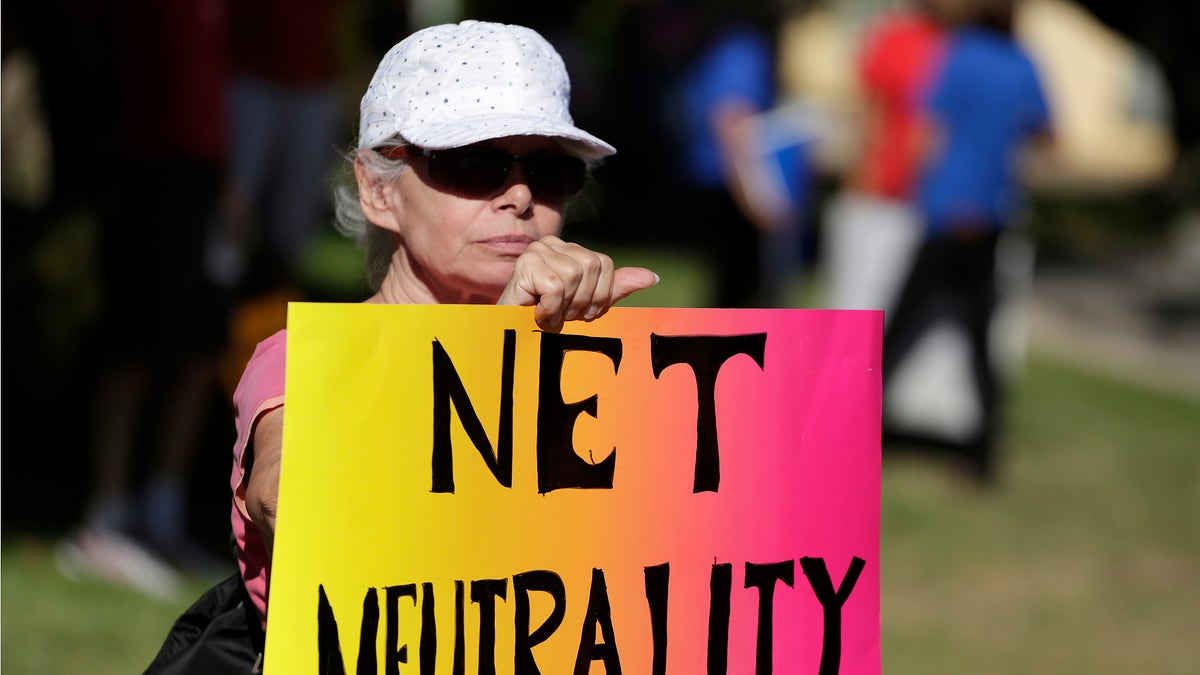
Lori Erlendsson attends a pro-net neutrality Internet activist rally in the neighborhood where U.S. President Barack Obama attended a fundraiser in Los Angeles, California July 23, 2014. REUTERS/Jonathan Alcorn (UNITED STATES - Tags: CIVIL UNREST POLITICS SCIENCE TECHNOLOGY) - RTR3ZWDE (REUTERS/Jonathan Alcorn)
Now's your chance to crash a government website by merely stating your opinion, again.
The Federal Communications Commission (FCC) is feeling the cyber pressure with a digital deluge of consumer comments on proposed Net Neutrality rules. Net Neutrality is the principal under which the Web currently operates, regarding all (legal) Internet traffic as equal digital packets and not allowing discrimination based on fees.
The current brouhaha began in January when a D.C. court ruled that the FCC could not enforce Net Neutrality principals. It meant the FCC could not stop ISPs such as Verizon from charging companies like Amazon and Google extra fees to get onto a faster connection and reach consumers more easily. If the FCC wanted to protect Net neutrality it would have to craft new regulations (it has tried several times)--or reclassify broadband ISPs as utilities.
Which brings us to where we are now, with the FCC considering new rules that would allow big companies to pay ISPs for quicker access to consumers on so-called fast lanes (also referred to as paid prioritization). It would in turn make it more difficult for consumers to access smaller Web sites that could not pay the additional fees. The agency has stated that it would still not allow ISPs to discriminate based solely on content (such as religious or political views) or to favor their own services over competitors.
Not surprisingly, with the Internet now a part of our daily lives, the idea of squelching access or preventing the next Silicon Alley startup from reaching customers has people tweeted off. A "Battle for the Net" campaign that posted the dreaded spinning "loading" wheel on sites earlier this week generated so many comments to the FCC that the issue has now surpassed the infamous Janet Jackson wardrobe malfunction in terms of responses: roughly 1.5 million comments and counting.
To make a comment by the Monday, September 15, deadline, go to the FCC comments page and the Protecting and Promoting the Open Internet proceeding. An FCC blog indicates the site is having trouble keeping up, so the agency is now also accepting e-mail comments.
The main fight now is whether to allow this revamping of the Internet in the U.S. - it wouldn't slow down access elsewhere in the world - or to do as several courts have indicated and have the FCC reclassify broadband ISPs as utilities, falling under the so-called Title II regulations.
Title II is a hefty set of rules continually revamped over the years to ensure that what are regarded as essential utilities - phone and wireless companies - do not stymie competition by preventing access or charging exorbitant rates for service. Under Title II, the FCC could then do what they originally attempted to do and preserve Net Neutrality. The only other alternative is to base new rules on a two-paragraph rule called Section 706 of the Telecommunications Act designed to promote broadband deployment. But Section 706-based rules would not stop ISPs from charging companies for faster Internet access--and in the process curtailing consumer access to other online services. It would only emphasize the FCC's mandate to "remove barriers to infrastructure investment."
Common sense would indicate that ISPs are without question utilities, more essential to business, communications, healthcare, entertainment, and transportation than any telephone company ever was. From TVs arriving at a Walmart to trucks on I-95, to emergency responders racing to the scene of an accident, it all relies on the Internet as an essential utility. Even voice calls and television broadcasts have moved online.
While Internet firms have protested against the idea of pay-to-play Internet access for U.S. businesses, lobbyists for the ISPs and telcos have been trying out various arguments in favor of paid prioritization: New rules would increase much needed investment - or new rules would curtail the currently high level of investment. The lobbyists are confused because they're not sure which company's business they're trying to protect or even how to protect it.
But this battle isn't about picking one business over another. It's about consumers being able to choose what information and services they receive because, while businesses fight over fees, ultimately it's the consumer who pays all the bills.
